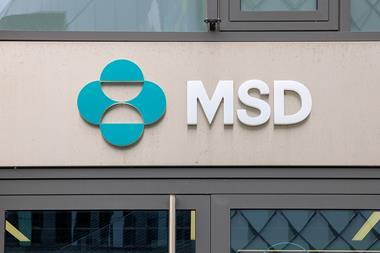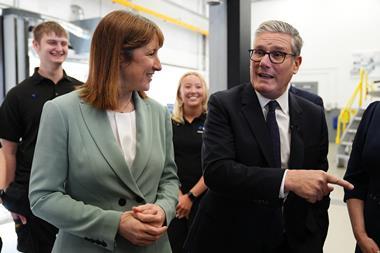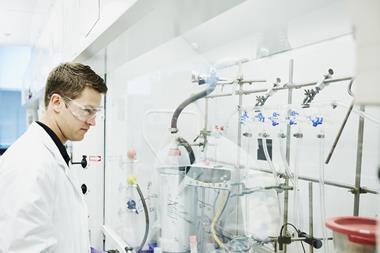
Several pharmaceutical companies have cancelled or paused major expansions of UK R&D facilities. The moves come alongside industry warnings that the UK is becoming ‘uninvestable’ for the life science sector, with particular concerns surrounding the amount that the country spends on new medicines.
On 10 September, US drugmaker Merck & Co, known as MSD outside the US and Canada, scrapped a £1 billion upgrade to its UK operations. The company will no longer occupy a new R&D site in central London that had been in the works for eight years and was due to open in 2027. It also plans to vacate laboratories at the London Bioscience Innovation Centre and Francis Crick Institute by the end of the year, with the company saying that it plans to move its life sciences research to the US.
Meanwhile, AstraZeneca is to ‘pause’ a £200 million expansion of its research site in Cambridge, which had been expected to support around 1000 new jobs. That follows a decision earlier this year to cancel plans for a £450 million expansion of a vaccine manufacturing plant in Merseyside, after negotiations over government contributions to the project collapsed.
In recent days, Eli Lilly has also paused its plans to spend £279 million on a new research incubator in London. French drugmaker Sanofi took a similar stance, saying it won’t consider ‘any substantial investment’ in UK R&D.
The decisions come soon after a breakdown in negotiations between pharmaceutical companies and the UK government over drug pricing. They also followed a warning from the Association of the British Pharmaceutical Industry (ABPI) that the UK was ‘losing the race for investment in R&D … due to drags on competitiveness’.
The ABPI’s chief executive, Richard Torbett, noted that while the UK has a world-class science base, it needs to ‘remove existing barriers’ if it is to unlock ‘billions in additional investment’ in early-stage R&D. ‘First and foremost, we need to create a commercial environment that rewards pharmaceutical innovation fairly and brings its benefits rapidly to UK patients,’ he added.
Medicine spend
In particular, the ABPI noted the UK’s ‘low investment in medicine’, pointing out that around 9% of the UK’s healthcare spend goes on medicines, compared to 20% in Japan, 17% in Spain and 14% in Germany.
The industry group is also critical of the ‘high and unpredictable clawbacks’ on companies revenues that must be paid back to the government under the voluntary scheme for branded medicines pricing, access and growth (VPAG). The VPAG scheme is essentially a levy on sales of drugs to the NHS over an agreed quota. In December, the government raised the rate from around 15% to nearly 23% for newer medicines.
Speaking at an emergency session of the House of Commons science committee on 16 July, AstraZeneca’s UK president Tom Keith-Roach said that these changes would cost the industry £13.5 billion over the next three years.
The UK has control over its regulator, its pricing and its medicines policy in a way which other European countries don’t
Tom Keith-Roach, AstraZeneca
Drug companies also want to see the National Institute for Health and Care Excellence raise its cost effectiveness thresholds, which would mean that the NHS could pay higher rates to provide patients with access to expensive new drugs.
‘The threshold for cost effectiveness – the value that the government puts on a quality adjusted life year – has not moved since 1999,’ Ben Lucas, MSD’s managing director for the UK and Ireland, told the science committee. ‘Yet in that period of time, our costs associated with running clinical development … increased tenfold.’
When asked whether pressure applied by the US government on the pharmaceutical industry to reduce drug prices and relocate manufacturing facilities had affected the recent investment decisions, Keith-Roach acknowledged that ‘the position that the Trump White House has taken has meant that this is a far more active conversation than it has been historically’.
‘I think that is really posing a clear question to the UK, from a policy perspective. The UK, as a sovereign nation outside Europe, has control over its regulator, its pricing and its medicines policy in a way which other European countries don’t,’ Keith-Roach added. ‘And I think the question is, how do we now move forward as a country in that context to improve access to medicines, but also in a way which allows the life sciences industry to attract investment and grow?’
Credibility challenge
That so many pharmaceutical companies are deciding to pause or cancel projects in the UK will pose a serious headache for the government. According to government figures, the sector is worth around £100 billion to the country’s economy and supports around 300,000 jobs.
Earlier this year, the government unveiled its vision for the UK to be the leading life sciences economy in Europe by 2030, and the third most important life sciences economy globally by 2035. While industry is broadly supportive of the government’s life sciences strategy, industry representatives have expressed concern that ambition from policymakers doesn’t always appear to have been backed up with concrete actions.
There’s been a 10-year decrease in investment and support for a vital industry. The only thing that’s going to give credibility is a financial settlement
Patrick Vallance, UK science minister
‘I might categorise it as a credibility challenge. The reality is that we’ve been having – with successive governments – this continued conversation about the potential of the UK to be able to pull down … on the talent that it has,’ Lucas told the science committee. ‘The ingredients are there, but the commitment, the choices to get behind those, need to exist,’ he added.
Later at the science committee hearing, science minister Patrick Vallance – a former president of R&D at GSK – said that he was ‘deeply concerned that there’s been a 10-year decrease in the investment and support for a vital industry’. According to Vallance, ‘the only thing that’s going to give credibility is a financial settlement’.
‘The long-term security that industry is now looking for is a pricing and commercial environment that they think meets their needs and meets the current political environment, where the US is also looking at reference pricing,’ he added. ‘That’s the thing we need to fix now, I think the other things are in a good place, and the life sciences sector plan is a very good road map that should go on.’
Responding to the investment cancellations, Rosalind Gill, director of policy at the National Centre for Universities and Business warned that the government needed to take action to avoid the further damage to the UK’s life science sector.
‘The UK has world-class science, but too often that strength does not translate into business confidence and investment. Business R&D spend fell to £50 billion in 2023 – 6% lower in real terms than in 2021 – while other countries forge ahead,’ she said.
While Gill pointed to some bright spots, including a pledge of £1 billion in investment over ten years by BioNTech, she noted that ‘the overall trend and latest data is concerning’.
‘To turn the tide, businesses consistently tell us they need clearer national priorities, simpler access to support, and reformed public bodies that focus more directly on industry needs,’ she added. ‘Without this, the UK risks seeing opportunity and investment move elsewhere.’

















No comments yet